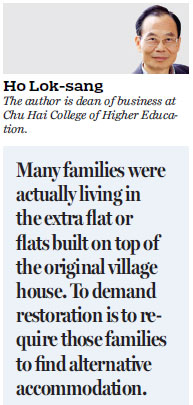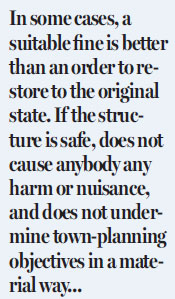Legalization for some unauthorized building work worth considering
Updated: 2018-01-16 07:46
By Ho Lok-sang(HK Edition)
|
|||||||||
Unauthorized structures are ubiquitous in Hong Kong, for a good reason: developable land is scarce and turning raw land into developable land is very difficult, takes a long time and may be socially costly. The price of land has skyrocketed, and so have home prices. Unauthorized structures sometimes add floor space to a home, sometimes create space for new homes and sometimes add amenities. There is an imperative to check against unauthorized structures, because they can be a safety hazard, they are not allowed on the land lease and they could undermine the effectiveness of town-planning initiatives.

Still, banning them altogether need not be the best way going forward. Yes, the name of the law should be preserved. What is illegal is illegal, and the perpetrators need to face the legal consequences. But in some cases, a suitable fine is better than an order to restore to the original state. If the structure is safe, does not cause anybody any harm or nuisance, and does not undermine town-planning objectives in a material way, a fine combined with recovery of unpaid rates due to under-assessment of the rateable value of the property, and upward revision of rates to reflect higher rateable value in the future, may be all that is needed.
Some years ago, when Chief Executive Carrie Lam Cheng Yuet-ngor was still secretary for development, she gave the owners of village houses the option of having illegal structures registered instead of restoring the property to the state as specified in the original plan of the property. She did so not just because of strong opposition from the indigenous New Territories people, but also because it may not be practical to do otherwise. Many families were actually living in the extra flat or flats built on top of the original village house. To demand restoration is to require those families to find alternative accommodation. It would certainly "add oil to the fire" given the overheated housing market.
But having such houses "registered" with no follow-up action whatsoever actually undermines the authority of the law. Were those who breached the law punished in any way? Are the rates on these properties revised upward? Are the unpaid parts of underpaid rates recovered? Were the owners required to hire authorized persons to certify the illegal structures safe?
There is a principle in public economics called Pareto efficiency. If it is possible to do something to raise the welfare of at least one person without undermining that of any other person, that something is "Pareto improving". When all such opportunities to improve people's well-being are exhausted, that state is called Pareto optimal or Pareto efficient. My question is: If an unauthorized structure is safe, does not bother anyone, and is not inconsistent with the goals of town planning, why should it be removed? The authority of the law can be, and is actually better upheld if the property owner is fined appropriately and if the unpaid rates are recovered, than if the law is enforced only when and where it is convenient.
Think about it: after the unauthorized basement under the York Road residence of Lisa Kuo Yu-chin - the wife of former contender for the chief executive post Henry Tang Ying-yen - was discovered, she was asked to restore her home to the original state. The results of the destruction of the basement were: useful space was gone, a lot of solid waste was created and needed to go to the landfill, and truckloads of soil/gravel had to be transported to the site to fill up the basement.

It seems obvious to me that it is Pareto efficient to legalize that basement with a fine, recovery of unpaid rates, and a revision of rates. The fine can be as big as is needed to serve effectively as a deterrent for others against starting illegal structure projects.
In a sense, the illegal structures represent a market response to the high cost of land and housing. Hong Kong people are well known for their strong market sensitivity. There is no doubt that our housing crisis today would have been much worse if there were no illegal structures. The fact is: even if we had the capacity to enforce the law to the letter, we just could not and would not do that. We would not drive people out of their illegal homes and make them street sleepers. The halfway house approach that we have adopted by default does not give more respect to the law than the conditional legalization that I advocate.
In short, I propose that the legalization of unauthorized structures be subject to three conditions: their owners must hire authorized persons to certify that they are safe every 10 years; that they do not meet the objection of the town-planning authorities and do not cause a nuisance to others; that they repay all owed rates due to under-assessment of rateable values in the past, and start paying higher rates that reflect fully the existence of those structures.
If they fail to meet the conditions as stipulated, removal of the structures should be mandatory.
(HK Edition 01/16/2018 page8)